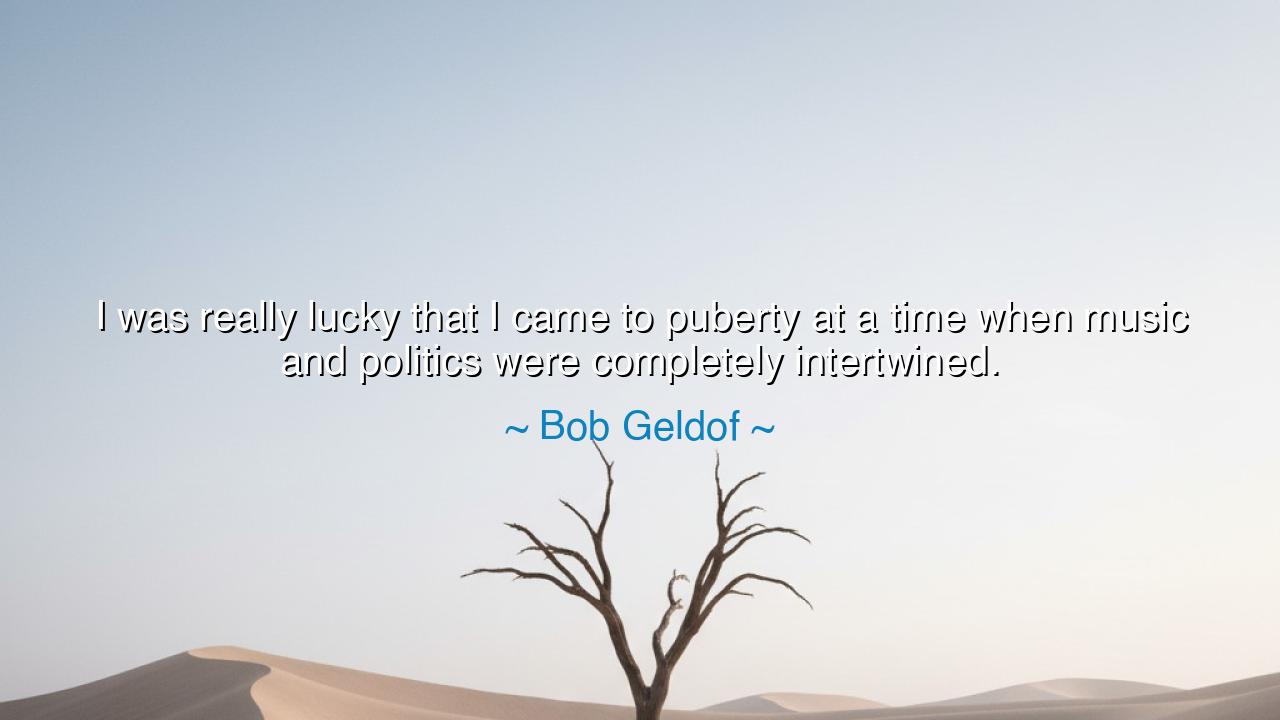
I was really lucky that I came to puberty at a time when music
I was really lucky that I came to puberty at a time when music and politics were completely intertwined.






Hear the words of Bob Geldof, spoken with both memory and fire: “I was really lucky that I came to puberty at a time when music and politics were completely intertwined.” These words are not only a recollection of his youth but a testimony to an age when sound and struggle walked hand in hand. He declares himself fortunate, for to be young in such a time was to discover that songs were not mere entertainment, but weapons, banners, and prayers. It was to learn that the chords of a guitar could echo like thunder across the halls of power, and the voices of the people, raised in chorus, could shake the foundations of nations.
The union of music and politics is as old as civilization. The ancients knew it well, for every revolution was born to song, and every triumph was crowned with melody. The Hebrew slaves sang as they fled their bondage. The Greeks lifted paeans to their gods before battle. The French Revolution was carried forward by “La Marseillaise,” a hymn of defiance that rallied the hearts of the oppressed. Geldof’s remembrance places him in that eternal tradition, an age when the voices of youth fused with protest, and to listen to a record was also to join a movement.
Consider the 1960s, when Bob Geldof was coming of age. The Vietnam War raged, civil rights were contested in the streets, and everywhere the young raised their voices not only in speeches but in songs. Bob Dylan sang that the times were changing; Joan Baez lifted her voice against injustice; John Lennon declared his dream of peace. To be a youth in those days was to find puberty not only in the body but in the soul—to awaken to the fire of conscience, stirred by the very music that filled the air. Geldof’s fortune was to grow in this crucible, where art and action were one.
His own life proves the power of this union. Years later, Geldof would harness the might of music to confront famine in Africa, creating Band Aid and Live Aid, bringing the voices of musicians together to feed the starving and awaken the conscience of the world. Would he have carried this vision had he not been shaped in an era when politics and music were intertwined? Likely not. The seed planted in his youth bore fruit in his maturity, and through him, millions heard not only melodies but the call to mercy and justice.
The meaning of his words is profound: that the young are shaped by the spirit of their times, and that when art and struggle unite, the youth inherit a vision greater than themselves. Geldof was lucky, yes—but his fortune is a reminder that each generation has its own crossroads. Some ages separate beauty from justice, but blessed are those that unite them, for in such ages the young learn that their voices can change the world.
The lesson for us is this: never let music be reduced to background noise, nor politics to distant debate. When they meet, when melody gives flesh to conviction, then society moves. The songs we sing should not only soothe but awaken, not only delight but call to action. Each of us must ask: What is the song of my age? Does it challenge or only numb? Does it stir courage or only sell distraction? To choose our music is to choose our spirit.
Practical action lies in listening and creating with intention. Seek songs that give voice to justice, that remind you of your place in the greater story of humanity. Support artists who carry truth, not only glitter. And if you are gifted to create, let your creation carry not only sound, but message. As Geldof discovered, even one voice, when joined to the chorus of others, can turn despair into action, famine into relief, and silence into thunder.
So let these words be carried forward: “I was really lucky that I came to puberty when music and politics were intertwined.” Blessed is the youth who learns that art is not separate from life, but its fiercest weapon and its most tender prayer. May every generation find again that union of melody and meaning, so that the songs of today may become the victories of tomorrow.






AAdministratorAdministrator
Welcome, honored guests. Please leave a comment, we will respond soon